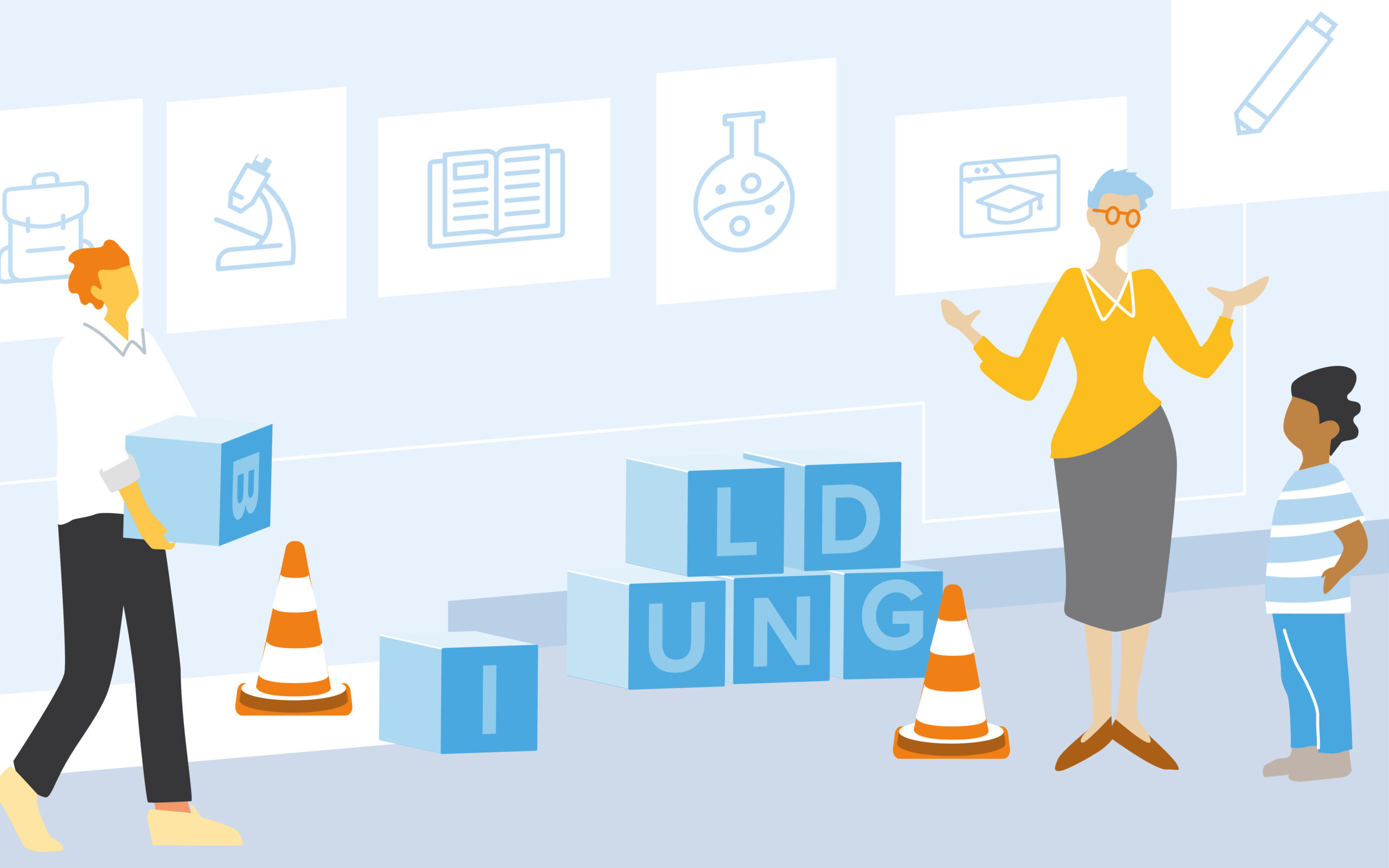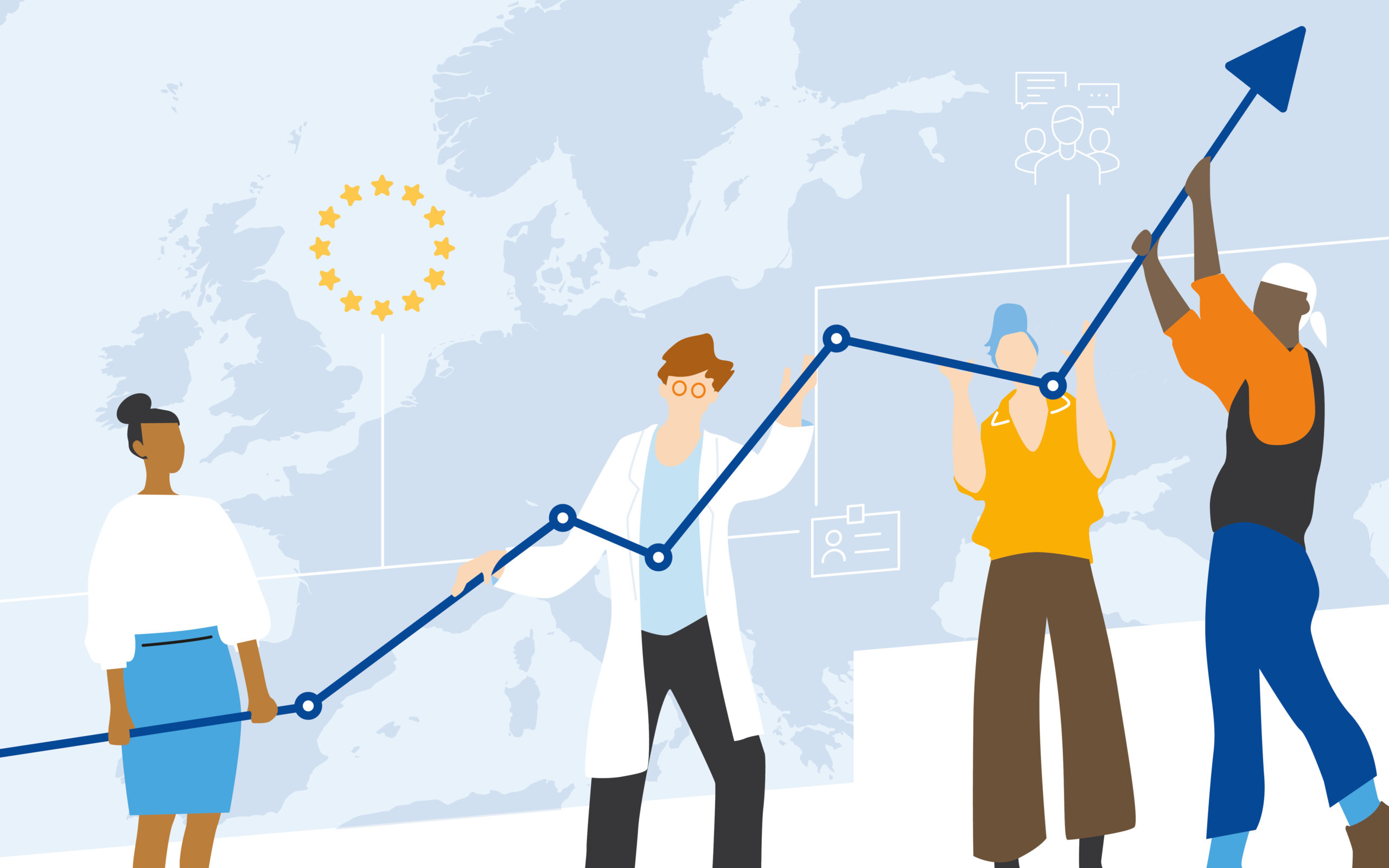THE EMPLOYERS TO
20TH LEGISLATURE
Is the luck of the fittest with us? If so, we'll put the Corona pandemic behind us this fall. And then, back to normal? Please don't. We should all ask ourselves one question: What have we learned as a society in the past few months?
The economy is often dismissed as an abstract construct: managers, sales, profits, etc. This is wrong. The economy is all of us. Without employees, no company runs. Without bright minds in the development departments, there are no innovative products. Without apprentices, companies have no skilled workers for tomorrow. Without employers who assume the entrepreneurial risk, the social market economy does not function.
At the same time, employees and employers alike depend on their companies being competitive. If it is not, it will not survive in the market. If the company is doing badly, the jobs also come under pressure. Everyone is in the same boat.

There are more in the boat:
Social security systems are financed by contributions from employers and employees. If the economy goes badly, we cannot afford many things. The same applies to the state. When the economy is humming, tax revenues bubble up. That's good for investments, infrastructure, education, daycare, etc.
So how can we strengthen the economy that benefits us all?
How can we emerge stronger from the pandemic?
This is not the time for apportioning blame. We want to move forward together. We want to modernize our country. We want to create good, competitive jobs in Germany. We want to reduce our debts through sustainable growth. To do this, we need to set the right course. That is why we, as employers, are making an offer to politicians on social and economic policy issues. Our common goal should be to strengthen our economy. Because:
ECONOMY WE ARE ALL.
With this publication, employers present their expectations of politics and of the future federal government of the 20th legislative period. We would like to use this brochure to stimulate discussion and invite you to join us in the conversation.
You can read the publication download here, scroll further or jump to the desired topic using the following links.

>> Download chapter
Die Pandemie hat deutlich gemacht, dass es an vielen Schulen in Sachen Digitalisierung an grundlegenden Dingen fehlt. Wir brauchen eine funktionierende digitale Infrastruktur, schnelles Internet und digitale Lehr- und Lernkonzepte an Schulen, aber auch an Berufs- und Hochschulen, um zeitgemäßen Unterricht zu ermöglichen. Die Umsetzung des DigitalPakts Schule muss beschleunigt und bestehende Hürden abgebaut werden. Dies gilt insbesondere mit Blick auf eine wirksame Lehrerfortbildung.
Die Fachkräftelücke im sog. MINT-Bereich (Mathematik, Informatik, Naturwissenschaften, Technik) ist auch in der Corona-Krise nicht kleiner geworden. Mit dem wirtschaftlichen Neustart wird sie noch deutlich ansteigen. Die Studienabbruchsraten sind hier immer noch überdurchschnittlich hoch. Wir brauchen daher einen MINT-Aktionsplan 2.0, der beginnend bei der frühkindlichen Bildung die Neugierde und das Interesse an mathematischen, naturwissenschaftlichen und technischen Zusammenhängen sowie Fragestellungen, insbesondere auch im Hinblick auf digitale Anwendungen, stärkt. Ein besonderes Augenmerk muss dabei Mädchen und jungen Frauen gelten, die im MINT-Bereich noch immer deutlich unterrepräsentiert sind.
Die gute Zusammenarbeit von Hochschule und Wirtschaft ist wichtig für den Wirtschaftsstandort Deutschland und die Nachwuchssicherung. Insbesondere Studiengänge mit hoher Praxisrelevanz müssen gestärkt und vor allem das Erfolgsmodell Duales Studium ausgebaut werden. Außerdem muss die Antragstellung beim BAföG stark vereinfacht und vollständig digitalisiert werden, um Hürden abzubauen. Parallel sollten Stipendienprogramme und insbesondere das Deutschlandstipendium weiter ausgebaut werden.
Frühkindliche Bildung ist entscheidend für einen guten Start der Kinder in das Bildungssystem und damit grundlegend für Bildungs- und Chancengerechtigkeit. Die Bundesförderung für den Kita-Ausbau sollte fortgesetzt, aber mit einem neuen Schwerpunkt auf die Qualitätssteigerung der Betreuung verbunden werden – vor allem mit einer nachhaltigen Sprachförderung. Bund und Länder sollten zudem die Fachkräftesicherung im Kita-Bereich vorantreiben, die praxisintegrierte Ausbildung ausbauen und die Digitalisierung in den Kitas unterstützen.
Die Betriebe führen die duale Berufsausbildung auch in Zeiten von Corona verlässlich fort. Ausbildungsbetriebe und Auszubildende brauchen aber sachgerechte und zielgenaue Unterstützung in der Krise, z. B. mit der Weiterführung des Bundesprogramms „Ausbildungsplätze sichern“. Das Matching zwischen Bewerberprofil und Berufsprofil ist eine bleibende große Herausforderung – regional, fachlich und persönlich. Deshalb muss die Berufsorientierung und -beratung an den Schulen intensiviert werden. Zudem braucht es einen Digitalpakt für die Berufsschule, der die Digitalisierung im Bereich der dualen Ausbildung gezielt voranbringt.
Die Pandemie hat deutlich gemacht, dass es an vielen Schulen in Sachen Digitalisierung an grundlegenden Dingen fehlt. Wir brauchen eine funktionierende digitale Infrastruktur, schnelles Internet und digitale Lehr- und Lernkonzepte an Schulen, aber auch an Berufs- und Hochschulen, um zeitgemäßen Unterricht zu ermöglichen. Die Umsetzung des DigitalPakts Schule muss beschleunigt und bestehende Hürden abgebaut werden. Dies gilt insbesondere mit Blick auf eine wirksame Lehrerfortbildung.
In addition, we need to make employees fit for change. With a view to the digital transformation, the half-life of knowledge is is becoming shorter and shorter. Lifelong learning is increasingly becoming a mandatory part of every working life.

>> Download chapter

DUSTING OFF THE DUST
>> Download chapter


The imminent retirement of the baby boomers will fundamentally shift the ratio between pensioners and contributors. While today there are 53 pensioners for every 100 contributors, this number will rise to almost 70 in the next 15 years. At the same time, the increasing ageing of our society will also lead to a substantial rise in costs in health and nursing care insurance. Without the necessary reforms, the overall social security contribution, which is 40 per cent today, threatens to rise to around 50 per cent by 2040. This would not only be a huge blow to the competitiveness of German companies, which already have to contend with a comparatively high tax and contribution burden internationally. Such an increase would also drive a wedge into our solidarity community and call into question intergenerational justice.
Making the social security system fit for the future and financing it sustainably is therefore one of the most urgent political tasks. The aim must be to stabilise the contribution rate at below 40 per cent in the long term. For this to succeed, the necessary reforms must be tackled as quickly as possible, i.e. in the coming legislative period. Our welfare state is a success story, but it must remain affordable.
>> Download chapter

One thing is clear: Germany must finally become simpler.
When it comes to digitizing the administration, politicians should therefore keep an eye on the ecosystem of companies and administration as a whole. Simply digitizing individual administrative services or a federal patchwork of different digital standards and solutions will not help. The Online Access Act (OZG) must therefore now be implemented quickly and in close coordination between the federal, state and local governments. At the same time, we must continue to drive forward the reduction of bureaucracy in order to relieve the burden on companies in the economic reboot.
>> Download chapter

>> Download chapter







